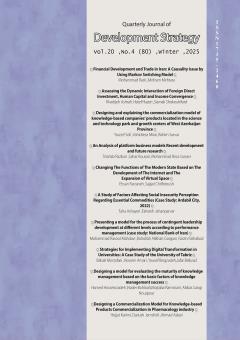Designing a model for evaluating the maturity of knowledge management based on the basic factors of knowledge management success
Subject Areas :
Hamed Hosseinzadeh
1
,
Nader Pahlavi
2
,
mojtaba ramazani
3
,
Abbas SANGI NOUR POUR
4
![]()
1 - PhD student Department of Management, Islamic Azad University, Bonab , Iran
2 -
3 - -
4 - Assistant Professor of Business Administration, Bonab Branch, Islamic Azad University, Bonab, Iran
Keywords: Keywords: organization knowledge, knowledge management, maturity of knowledge management, oil company.,
Abstract :
Hamed Hosseinzadeh Nader Bohlooli Mojtaba Ramezani Abbas Sangi Nourpour Abstract Context and purpose: The output of measuring the maturity level of knowledge management is a report on the status of the organization's strengths and weaknesses in establishing knowledge management, which can, as a road map, determine the perspective of the organization's actions in the field of knowledge management. Therefore, the aim of the current research is to design a knowledge management maturity evaluation model based on the essential factors of knowledge management success in Iran's National Oil Products Distribution Company. Methodology: From the point of view of the goal, the current research is developmental and has a qualitative approach, in the form of an interpretive paradigm. Thematic analysis strategy was used to analyze the obtained data. The research community, managers and experts of the National Oil Products Distribution Company and university experts who were selected purposefully based on theoretical saturation. The data collection tool was semi-structured interviews. To validate the research model, two strategies of external review and pluralism were used. Findings: The findings of the research showed that six main themes, twenty-four organizing themes and one hundred and thirty-four basic themes are effective on evaluating the maturity of knowledge management based on the basic factors of knowledge management success. Conclusion: Evaluation of the maturity of knowledge management based on the basic factors of knowledge management success with the themes and results obtained from six overarching themes and twenty four organizing themes including the knowledge management process (flow of knowledge management, implementation of knowledge management, knowledge sharing and publication, architecture organizational knowledge, evaluation of knowledge management); Content of organizational knowledge (quality of organizational knowledge, importance of organizational knowledge, documentation of organizational knowledge); Organization's human resources (employee motivation, human resource empowerment, work team morale, elite associations and employee training); Organizational culture (organizational values, attention to organizational change, team building, organizational atmosphere); Aligning the knowledge management strategy with the organization's strategy (knowledge management strategies, senior management support; facilities and resources; knowledge management re-engineering); The structure of the organization (organizational knowledge leadership, information and communication technology, source and knowledge base) was approved.
